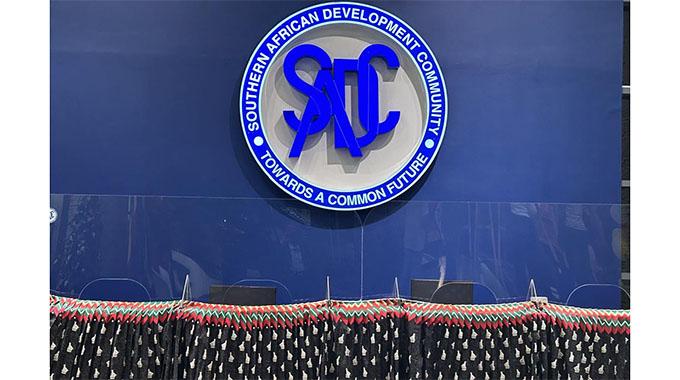News / National
Sadc meets over Mozambique post-poll crisis
06 Nov 2024 at 06:56hrs |
0 Views

The Southern African Development Community (SADC) is set to convene an extraordinary summit in Harare, Zimbabwe, from November 16 to 20, 2024, to discuss political developments in the region, including the ongoing post-election crisis in Mozambique. The summit will also focus on recent elections in Botswana and the upcoming elections in Namibia.
This was announced by Information Minister Jenfan Muswere during a post-Cabinet media briefing in Harare yesterday. Muswere stated that the summit will be primarily convened to address emerging regional issues of significance.
"The nation is informed that an extraordinary summit of SADC Heads of State and Government is scheduled to be held in Harare from November 16 to 20, 2024, primarily to address emerging issues of regional significance," Muswere confirmed. "The summit is expected to be briefed on political events in the region, including the recent elections in Mozambique and Botswana and upcoming polls in Namibia."
Mozambique has been grappling with widespread protests following its recent elections, with the opposition rejecting the results that saw the ruling Frelimo party extend its decades-long rule. The largest opposition party, led by Venâncio Mondlane, called for a general strike and week-long demonstrations that began on October 31. Clashes with security forces have resulted in at least 10 deaths, numerous injuries, and over 500 arrests, according to the Centre for Public Integrity, a Mozambican non-governmental organization that monitors electoral processes.
In response to the unrest, Mozambique's Foreign Affairs Minister, Verónica Macamo, accused opposition leader Mondlane of instigating violence and public disturbances that led to deaths and destruction of infrastructure. There are growing concerns that a major protest planned for tomorrow, with thousands expected to march in the capital, Maputo, could escalate into further violence.
As the current chairperson of SADC, Zimbabwean President Emmerson Mnangagwa is expected to lead the summit discussions. As SADC chair, Mnangagwa plays a key role in overseeing the regional bloc's governance structure, providing policy direction, and engaging with SADC Secretariat staff. His leadership will be crucial in navigating the delicate political situation in Mozambique, especially given the historical ties between Frelimo and the ruling Zanu-PF party, which both emerged from the liberation struggle.
Mnangagwa has faced criticism for his early congratulations to Frelimo leader Daniel Chapo before the official announcement of the election results, a move that sparked controversy amid ongoing disputes over the election's legitimacy.
International human rights organizations, including Amnesty International, have called for decisive action from SADC and other regional bodies in response to the crisis in Mozambique. Amnesty has condemned the violent repression of peaceful protests and called for the protection of the right to protest.
"The international community must take a clear stand against the human rights violations in Mozambique. Neighbouring countries, SADC, and the African Union must speak out against the authorities' violent repression of peaceful protests," Amnesty International said in a statement.
The extraordinary SADC summit in Zimbabwe next week is expected to play a pivotal role in shaping the regional response to the crisis in Mozambique, as well as addressing other key political developments across the region.
This was announced by Information Minister Jenfan Muswere during a post-Cabinet media briefing in Harare yesterday. Muswere stated that the summit will be primarily convened to address emerging regional issues of significance.
"The nation is informed that an extraordinary summit of SADC Heads of State and Government is scheduled to be held in Harare from November 16 to 20, 2024, primarily to address emerging issues of regional significance," Muswere confirmed. "The summit is expected to be briefed on political events in the region, including the recent elections in Mozambique and Botswana and upcoming polls in Namibia."
Mozambique has been grappling with widespread protests following its recent elections, with the opposition rejecting the results that saw the ruling Frelimo party extend its decades-long rule. The largest opposition party, led by Venâncio Mondlane, called for a general strike and week-long demonstrations that began on October 31. Clashes with security forces have resulted in at least 10 deaths, numerous injuries, and over 500 arrests, according to the Centre for Public Integrity, a Mozambican non-governmental organization that monitors electoral processes.
In response to the unrest, Mozambique's Foreign Affairs Minister, Verónica Macamo, accused opposition leader Mondlane of instigating violence and public disturbances that led to deaths and destruction of infrastructure. There are growing concerns that a major protest planned for tomorrow, with thousands expected to march in the capital, Maputo, could escalate into further violence.
Mnangagwa has faced criticism for his early congratulations to Frelimo leader Daniel Chapo before the official announcement of the election results, a move that sparked controversy amid ongoing disputes over the election's legitimacy.
International human rights organizations, including Amnesty International, have called for decisive action from SADC and other regional bodies in response to the crisis in Mozambique. Amnesty has condemned the violent repression of peaceful protests and called for the protection of the right to protest.
"The international community must take a clear stand against the human rights violations in Mozambique. Neighbouring countries, SADC, and the African Union must speak out against the authorities' violent repression of peaceful protests," Amnesty International said in a statement.
The extraordinary SADC summit in Zimbabwe next week is expected to play a pivotal role in shaping the regional response to the crisis in Mozambique, as well as addressing other key political developments across the region.
Source - newsday
Join the discussion
Loading comments…



























